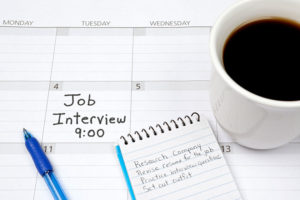There’s no denying it: Job interviews can be stressful. The spotlight is on and there’s a lot on the line, especially for returning citizens. But fear not! Job interviewing is a skill, one that can be practiced and learned.
The tips below will help you gain confidence in your interviewing skills and make sure your most important characteristics and abilities shine through.

BEFORE THE INTERVIEW
Acing your interview starts well before you ever step foot inside the door. Preparation is critical to success. These four steps will help make sure you’re ready for your interview.
Prepare a Resume
Most employers will want to see a resume, which provides a summary of your qualifications for the job. Some will request one with your application, but either way, it is a good idea to bring a resume to your interview. Your resume gives you a chance to highlight your skills and experience and gives the interviewer something to reference during and after the interview.
You may consider including things such as volunteer work, professional organizations or associations you belong to, or any other experience that is directly relevant to the characteristics, skills, or experience needed for the job.
For more information on how to prepare a resume, click here.
Research
Research is critical to a job interview. Be sure to read about the organization and learn as much as you can about what they do and how they do it so you can tailor your interview responses to the specific mission of the organization. Also familiarize yourself with the job description so you can use your interview to explain how you meet the criteria for the position.
Think of examples that demonstrate your strengths, and for any areas where you don’t feel as strong, do some research on how you could gain experience in those areas—community college courses, free online training, apprenticeship, etc.—to demonstrate initiative.
Practice
They say practice makes perfect, and interviewing is no different. It is important to practice in advance so you are prepared, confident, and calm during your interview. Think through or write out responses to some of the commonly asked interview questions, such as:
- Tell me about yourself.
- Why do you want this job?
- What makes you the ideal candidate for the job?
- What are your strengths? What are your weaknesses?
- Tell me about a time when you… (Examples: overcame a challenge, displayed leadership, worked with a team, identified a problem and solution, etc.)
Remember to answer honestly and focus on what you would bring to the job, not what the job would do for you.
Next, think of some relevant questions you’d like to ask about the job. Often at the end of an interview, the interviewer will ask if you have any questions. Asking thoughtful questions shows that you are engaged and interested.
Stay away from questions about salary, work schedule, or benefits for now–those can come at a second interview or if you are offered the job. Instead, ask questions about the type of work you’ll be doing, the nature of the work environment, or how you could best serve the organization.
Lastly, practice out loud. Have a friend or family member to ask you sample questions and give feedback on your responses. This will help you feel more comfortable thinking on your feet and speaking confidently. You can also practice in front of a mirror so you can watch your body language as you speak.
Consider Your Attire
What you wear is a big part of the first impression you make on others, so plan your outfit in advance. What you should wear depends on the position you are applying for—while a business suit would be appropriate for an office job, it may not be necessary for construction work. But regardless of the job, you want to look professional. Choose clothes that are conservative, fit well, and wrinkle-free.

DURING THE INTERVIEW
The day has arrived: It’s time for your interview. The good news is that the hard part is already behind you. At this point, it’s just a matter of taking all your practice and preparation and putting it to good use.
Pay Attention to Nonverbal Communication
Communication experts will tell you that what you say isn’t nearly as important as how you say it. That is because your nonverbal communication–gestures, tone, volume, posture, etc.—conveys a very powerful message.
In an interview, your nonverbal communication can say, “I’m knowledgeable, passionate, and friendly.” Or it can say, “I’m nervous, uncertain of myself, and difficult to be around.” Here are a few tips to make sure you’re sending the right message:
- Turn off your cell phone (and tablet, mp3 player, or any other device) and put it away before entering the room.
- Greet your interviewer with a smile and a handshake, if offered.
- Make frequent eye contact with your interviewer.
- Avoid slouching or sitting with your arms crossed at your chest.
- Listen to your interviewer when they talk and do not interrupt; nod as appropriate to indicate that you are listening.
- Speak clearly and take your time when answering questions. If you need extra some time to think, take a deep breath or say something like, “That is a great question, and I’d like to really give it some thought. If you don’t mind, I’ll take just a few seconds to gather my thoughts.”
- Bring at least two copies of your resume–one for you and one for your interviewer. Consider bringing a notebook and pen to jot down any important notes during the interview.
- Lastly, be confident in yourself. Know that the outcome of the interview does not determine your self-worth; you have value and nothing can take that away from you.
Show Results
When responding to your interviewer’s questions, try to provide examples that show the results and impact of your work.
For example, if asked, “Why would you be a good secretary?”
You could say, “I am very organized.” (Statement)
But it would be better to say, “I am very organized. For example, when I worked at the DMV, I had to keep track of the status of all the applications.” (Statement, Example)
And it would be best to say, “I am very organized. For example, when I worked at the DMV, I had to keep track of the status of all the applications. When I first started, the applications were just kept in folders in different piles. To better organize the process, I created an Excel sheet and logged the status of the folders so all DMV employees could look up where a particular folder was at any given time. This decreased the number of times that folders got lost, and they still use this system today. I would apply similar organizational and problem-solving skills to the secretary position at your organization.” (Statement, Example, Results, Impact)
Be Prepared to Address Your Criminal History
We talked above about the importance of being honest in your resume, and the same goes for your interview. But talking about difficult subjects can be even tougher face-to-face, especially if it’s related to your criminal history. The tips below can help you handle interview questions about this part of your life with grace.
Know the Rules
Federal law does not prohibit employers from asking about your criminal history. However, several states have laws about employers’ use of arrest and conviction records to make employment decisions. These laws may prohibit employers from asking about arrest records or require employers to wait until late in the hiring process to ask about conviction records.
If you have questions about these kinds of laws, you should contact your state’s fair-employment agency for more information.
Decide How to Handle the Situation Before Your Interview
Regardless of your state’s laws, the topic of your criminal history may come up in an interview due to a gap in your employment history, a skill you learned while incarcerated, current parole restrictions, or for another reason. First and foremost, it is critical that you do not lie; this could have many negative consequences including termination.
Beyond that, it is up to you to decide how much you will or will not share, but it is worth considering being upfront and honest about your situation. Proactively bringing up the topic in the course of conversation gives you control of the conversation and allows you to share what you think is most important for your employer to know.
Focus on Your Growth
When discussing your criminal history, keep it short and sweet. Do not get into the details of your crime; instead take responsibility for your actions and show how you’ve grown. You might share positive changes you made while in prison or things you’ve done since your release, such as earning a degree, completing a job training program, or taking part in a mentoring program.
AFTER THE INTERVIEW
After the interview is complete, it is a good idea to follow up via email (or letter if you do not have access to email) within a few days. Your note should thank the interviewer for their time, let them know you enjoyed learning more about the position, and reiterate that you are interested in the position.
Close by expressing that you look forward to speaking with them again soon. If they asked for some follow-up at the interview—a list of references, a letter of recommendation, etc.—be sure to provide this information as well.
Now it’s time to wait. If you are offered the position, congratulations! But if it doesn’t work out this time around, something good can still come out of the experience. Follow up by thanking the interviewer for the opportunity and asking them to please keep you in mind if something comes up in the future.
You may also choose to politely ask if they have any constructive feedback on your interview that would help you better prepare for future. Each interview puts you one step closer toward achieving your goals!
*Adapted from “Employment Information Handbook For Ex-Offenders.” PDF. U. S. Department of Labor, 2005.
DOWNLOAD THIS RESOURCE
Download a copy of this resource to help you on your journey to employment after prison.
DOWNLOAD